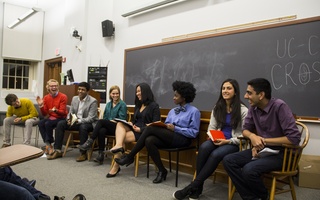{shortcode-90c0a193622fcce9ac07691aa0bf123954818a49}
Abraham Lincoln famously wrote, in a moment of great moral fortitude, that by “giving freedom to the slave, we assure freedom to the free — honorable alike in what we give, and what we preserve.”
As I’ve poured over the deluge of photos and video footage from this week’s tear gas incident at the southern border, when law enforcement agents launched canisters of the chemical spray at approaching migrants, including many children, I’ve thought also about the precedent we might be setting for ourselves. If we will not give safety to the immigrant, can we ever assure it to ourselves? Lincoln — not to mention the basic law of karma — suggests not.
Some of the images evoke open cruelty: Mothers dodging gas, small diaper-clad children sobbing. Others trade more in the ironic, like the picture of a young Central American woman who found cover under a sheet painted like the American flag. All the images are laden with the markings of suffering and hope, often in close quarters. That combination, I found from my own experience viewing, elicits a particularly strong moral reaction.
A close friend and I were recently trying to make sense of the tear gas skirmishes. He (a conservative) and I have on several occasions talked about how to balance a commitment to human dignity and rights with national security concerns. My personal position after the events of this week was that the chips had fallen too clearly for extensive debate. What the evidence demanded first and foremost was compassion. “It just all feels so wrong,” I told him.
I’ve been thinking since then about what else I might have said. Here is my best effort at a thoughtful response. We live in an era unfriendly to old-school appeals to morality. Our cultural and political commentators, politicians, and businessmen talk for the most part like they’re more interested in the minutiae of governance — whether tax rates, stock market figures, or demographic trends — than in the grander ideas of early democracy: Ideas like liberty, community, and the cultivation of character. Among these voices, the older voices of social progress — of emancipation, the New Deal, the anti-war movement, or Civil Rights — seem to have faded.
The result of three decades of this smothering technocratic talk is our present border war. The Trump administration has deployed the military to the border. It has expanded the size of Border Patrol. It has demanded that migrants remain outside the country as they await judicial decisions regarding entry. It has gone as far as separating children from parents and setting up long-term tent cities in the desert — all to more perfectly track individuals’ movements.
This is one way the border skirmishes push us closer to general anomie. We continue to talk about immigration like it was a science of rates and flows, a problem of missing data. The rub, as one commentator recently had it, is that we can’t precisely count people who are dodging government’s traditional feelers like tax returns or a permanent address.
This kind of thinking is what the French social theorist Michel Foucault famously called the condition of “veridiction”: Of being so obsessed with government as a kind of technical problem that one begins to prefer efficiency over principles like justice, liberty, or community.
We hear the language of veridiction all the time in the right’s criticisms of immigration: that immigrants take jobs, draw doles, and dodge the taxman. Besides being untrue, these myths evince an obsession with efficient — but not necessarily just or democratic — government. They imply that the immigrant’s chief fault is being unregulatable.
What we lose out on with that view is the strong moral dimension of our democratic citizenship, and in particular our call to charity. George Washington observed in his “Farewell Address” that “[o]f all the dispositions and habits which lead to political prosperity, religion and morality are indispensable.” For Washington, to be a patriot meant to always be guided by a sense of wrong and right, the “firmest props of the duties of men and citizens.” To look on the immigrant as a technocratic concern — another person to house and feed — is to overlook the demands of human compassion.
I’ve written before in these pages on the promise of our collective political inheritance for these difficult times. Last July, I wrote specifically on the potential for a new, reformed American exceptionalism. The argument would no longer be for benign imperialism or shouldering the “White Man’s Burden,” but for a return to what we might call the “moral republic”: The idea that we are a city upon a hill, setting an example of humane democratic conduct for the world. We would again strive to be an exemplar country with a unique civic consensus neither racial nor religious, but human.
Whether this new exceptionalism is in any way practicable remains to be seen at the southern border. As thousands of Central Americans arrive in the so-called “second caravan,” Americans must confront our mounting moral burden to respond, and to respond with kindness and understanding. I hope we will do so despite certain lingering questions of veridiction, like where to house or whom to employ or educate — what Lincoln called the “mere catch arguments” of obstruction.
If we are worthy of the rich political heritage afforded to us, we will answer these calls in the distinctly American way, “with malice toward none, with charity for all, [and] with firmness in the right.” To do otherwise would mean permanently surrendering the moral high ground, which I worry has already slipped out from under our feet.
Henry N. Brooks ’19 is a Social Studies concentrator in Currier House. His column appears on alternate Thursdays.
Read more in Opinion
Bacow Should be Deliberate When Choosing to Speak OutRecommended Articles
-
First KissesOur next kiss: We are in his bedroom, and I tell him I can’t sleep with him. I do not tell him that I’ve never had sex because I am Still Afraid. I do not tell this to any of the boys I kiss, catching the occasional wetness in my eyes before they can notice.
-
 Former New Zealand Prime Minister Visits Harvard, Shares Political Insights
Former New Zealand Prime Minister Visits Harvard, Shares Political Insights -
 Hey! Do You Have a Minute? It’s Me, Your Best Friend!
Hey! Do You Have a Minute? It’s Me, Your Best Friend! -
Borders Everywhere Are Becoming Real — and DeadlyIf we can’t defuse the bomb of nationalism, the risks might be unprecedented.
-
Telling the Story of the Migrant CaravanWhen we see other human beings in pain, we experience empathy. We try to help. That should have been the story of the migrant caravan.













